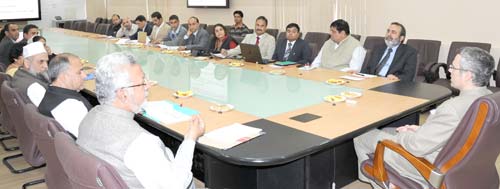In wake of the crisis over the quality of medicines that government purchases for its hospitals in Kashmir, Omar Abdullah government revived Congress’s plan of creating a new corporation for procuring drugs and other hospital requirements. RS Gull visits the proposal to understand pros and cons of the new structure.

It is a crisis being fought not only within the Congress but within the ruling coalition as well. Last week, on the day one of darbar move when Chief Minister Omar Abdullah presided over the meeting regarding setting up of J&K Medical Supplies Corporation (JKMSC), he started with a question: Who had authorized the Drug Controller General of India (DCGI) Dr GN Singh to make a public statement on the quality of drugs in J&K? Does the Central Drug Standard Control Organization (CDSCO) have any authority to talk in the state without taking J&K government in confidence? There was a pin drop silence in the meeting. Not even the officer who accompanied the central government official offered any idea till a middle rung officer quipped: It might have been authorized by Ghulam Nabi Azad, the Health and Family Welfare Minister.
Talking about the problems in fair implementation of the Pharmacy Act, Singh had told a select group of reporters that CDSCO will ensure the drugs “save lives and not take them”. He also had bored holes in the systems operational in the state. While Omar suggested his officials to send the visiting officer a rejoinder, the issue remains how the federal structure is gradually inching towards superimposing itself over the “leftover” autonomy that J&K retains, more so for political reasons.
But that argument is no fig leaf to hide the shamefulness of the process that was pumping public money to the “blue-eyed” for supplying spurious drugs to Kashmir hospitals, and not those in Jammu. After the two Congress ministers fought and started washing their dirty linen in public did the state’s watchdog apparatus start reacting. Now multiple agencies are working to find the guilt and the fix the responsibility. The accused are in police custody.
This situation led to the revival of a mechanism that was apparently in place already. The JKMSC was constituted during the reign of Lal Singh as health minister following passage of a law in the state assembly. To start with, some officers were given its charge in addition to the positions they were holding and they stopped delivering as the system lacked interest.
Though a number of states run corporations that make bulk purchases and supply for the health institutions, Rajasthan and Tamil Nadu are the two successful instances. It was in 2003 itself that a team of professionals was deputed to study the model and indigenize it for J&K. That exercise was done quite early. It is now being revived because new issues have cropped up new problems, something that happened in 2004 as well when the state health ministry officials were caught issuing bulk supply orders to three firms which were blacklisted by Ministry of Defence and three neighboring states. Making the corporation functional just got delayed because policy makers forgot it. But there are reports that the powerful lobby that makes the best of the purchases was responsible for encouraging the system against doing it.
Making bulk purchases reduce costs, make certain saving, increase accountability and help create a group that will specialize in this particular exercise. It will make supplies uniform to every hospital. It is the same logic that is making Omar government to push the JKSMC. “Given the pace with which we are working, the corporation must be in place within next four months,” Manoj K Dwedi, Principal Secretary (Health) told Kashmir Life. “It will make the system better.”
Right now, the processes of procurements are interestingly delaying and multiple. There are seven different agencies within the Health Services and Medical Education system that purchase drugs and equipment. The twin GMC and their associated hospitals have a purchase committee each, so has the twin Directorates of Health in Jammu and Srinagar. Then there is a purchase committee each for















